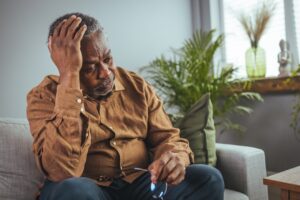 According to a scientific statement from the American Stroke Association, depression is common among stroke survivors. As many as one-third of people who have had a stroke may struggle with feelings of sadness and despair that can be debilitating.
According to a scientific statement from the American Stroke Association, depression is common among stroke survivors. As many as one-third of people who have had a stroke may struggle with feelings of sadness and despair that can be debilitating.
Far too often, depression is overlooked and underdiagnosed and can have an enormous negative impact on the quality of life for those who are going through it—but it doesn’t have to remain that way.
Advertisement
A proper diagnosis plus effective treatments can make a world of difference in helping people recover from the emotional trauma associated with their strokes. In this blog post, we’ll discuss what you need to know about depression after suffering a stroke: its causes, risk factors and symptoms, along with strategies that may help manage your condition.
The American Stroke Association suggests that stroke survivors who experience depression should seek evaluation and treatment. People who have had a stroke may suffer from a disruption of sleep, eating, continence, and other bodily functions, so self-care is critical. This should include reaching out to family and friends for emotional support. Unfortunately, both stroke and depression still carry some social stigma, and many stroke survivors are reluctant to seek help. They may also need extra support to acknowledge the symptoms of depression.
“Depression following a stroke can be a normal psychological reaction to the stress of the injury, disability or brush with mortality brought on by the stroke,” said Lee H. Schwamm, M.D., an American Heart Association volunteer. “In other cases, it may be caused by structural, electrical or biochemical changes in the brain. If certain brain regions are injured, the systems that regulate emotion may be damaged, producing depression, anxiety, or PTSD-like symptoms in stroke survivors. Depression and stroke are both examples of the many conditions which threaten brain health.”
Sen. John Fetterman, who had a stroke in May of 2022 and sought treatment for depression, has brought media attention related to stroke and depression. Fortunately, with this attention, the public has become more aware of the importance of depression treatments.
For those with depression, a combination of counseling, stress reduction, medication, and regular exercise can be helpful. Proper treatment of depression can not only improve mood, but it can also boost physical, intellectual, and cognitive recovery. Previous studies have shown that depression goes hand in hand with lower levels of social support, so reaching out to family and friends can be paramount for a stroke survivor’s long-term mental well-being.
Supporting Brain Health
While some degree of cognitive decline is nearly inevitable as you age, other numerous factors can take a toll on the ability of the brain to function at peak potential. This can affect memory, concentration, and overall brain function. The Smart Pill can help to enhance cognitive function and memory through 9 ingredients that help to support, nourish, and maximize brain health. These include ginkgo biloba, huperzine A, bacopa extract, rosemary extract, and a B vitamin complex. This unique formula helps to boost circulation, fight free radicals, and provide nutritional support to assist with cognitive function.
It can be tough for those who struggle with mood issues and anxiety to reduce symptoms. However, with the help of Anxiety Rescue, you can help to support healthy mood balance and cognitive function. Through various ingredients, this unique formula can help target multiple aspects of stress, mood support, and anxiety. Anxiety Rescue begins to work quickly and improves benefits and support as the weeks go on.
